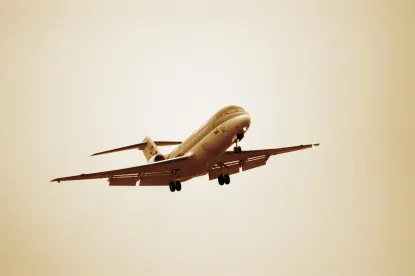On Friday, July 29, the US Office of Foreign Assets Control (OFAC) issued General License J under the Iranian Transactions and Sanctions Regulations (ITSR).[1] This general license authorizes non-US airlines to fly US origin aircraft into Iran for stays of up to 72 hours, activity which was previously prohibited under the ITSR without a specific OFAC license. The general license also helps align the Iranian sanctions regime with other OFAC sanctioned countries—Cuba, North Korea, Sudan, and Syria—each of which had similar general licenses or license exceptions.
The general license authorizes activity that was reported as being undertaken by foreign airlines notwithstanding the prohibition. More importantly, however, it gives clarity to aircraft leasing firms—particularly those who have Boeing aircraft or Airbus aircraft with GE engines—whom to now had been confronting a legal dilemma where lessees may be engaging in conduct that was subject to a prohibition with a history of unclear enforcement.
US persons are prohibited under Part 560.208 of the ITSR[2] from approving, financing, facilitating or guaranteeing any transaction by a foreign person, where the transaction by that foreign person would be prohibited if performed by a US person or within the United States. Under the existing law, companies leasing US-origin aircraft to foreign airlines who fly those aircraft into Iran without an OFAC license could be seen as "facilitating" those movements, and thus could be in violation of Part 560.208. With the issuance of General License J, aircraft leasing companies under this scenario would no longer be "facilitating" activities in violation of this section.
Under federal export control laws, which carry broad jurisdiction over US-origin goods no matter where they are located, every flight by an aircraft to a foreign country is considered a "reexportation" of that aircraft to that country. Under the existing Iranian sanctions regime, US-origin aircraft—including aircraft containing at least 10 percent US-origin components—had been prohibited from travel to Iran, regardless of whether the operator or airline controlling the aircraft was a US entity.
Notwithstanding the prohibition, this rule was very rarely enforced. Other US sanctions programs, including those targeting Cuba, North Korea, Sudan and Syria, had provisions built into their structure that allowed US-origin aircraft to fly into those countries on a temporary basis. The Iranian sanctions program was unique in not having such a provision prior to July 29.
Because of this aspect of the ITSR, coupled with the relatively loose enforcement of the temporary sojourn prohibition, many foreign airlines had been already flying covered US aircraft into Iran. This presented a problem for aircraft leasing firms, many of which were faced with an uncomfortable decision to lease aircraft to entities that may be violating a rarely enforced restriction or to reject the lease and cause the customer to go elsewhere. This general license appears to take a big step toward resolving such a dilemma.
Under the terms of the general license, "eligible aircraft" include fixed-wing civil (non-military) aircraft that are registered outside the United States or an embargoed country and that are classified under Export Control Classification Number 9A991.b. The general license authorizes reexportations of aircraft that are on "temporary sojourn" in Iran for a period of 72 hours or less.
Like many other OFAC licenses authorizing certain activities in Iran, this general license requires a careful look at what it both does and does not cover. The below activities are not covered by General License J, and still require a specific license from OFAC:
-
sales, leases, including wet leases, or transfers of operational control of aircraft to Iran or an Iranian entity;
-
reexports of rotary wing aircraft, unmanned drones or "optionally-piloted" aircraft to Iran on temporary sojourn;
-
reexports of aircraft by U.S. persons;
-
reexports of US-registered aircraft on temporary sojourn to Iran;
-
reexports, on eligible aircraft, of cargo that would require a specific license from OFAC under ITSR; and
-
reexports of aircraft, or any other transaction, with a blocked party under any provision other than under the ITSR (31 C.F.R. Part 560).
Additionally, in order to qualify under the general license, the non-US person must retain the right to hire and fire the cockpit crew, dispatch the aircraft and determine its routes, and perform principal maintenance on the aircraft. Principal maintenance on the aircraft must be undertaken outside of Iran under the control of a party who is not an Iranian national ordinarily resident in Iran. Furthermore, the aircraft must not bear an Iranian air carrier's logo nor carry a flight number issued to an Iranian air carrier, nor may its place of registration be changed to Iran.
[1] 31 C.F.R. Part 560.
[2] See 31 C.F.R. § 560.208.





 />i
/>i
